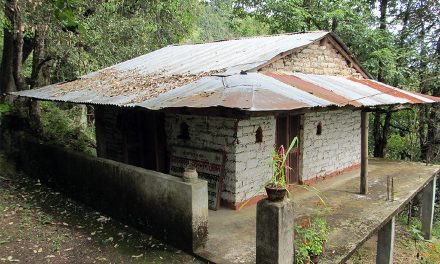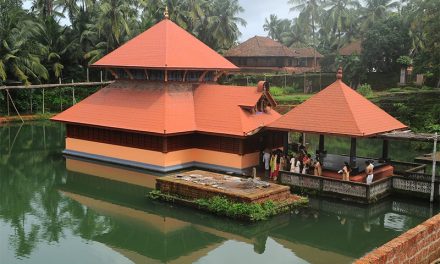The Varahi temple of Caurasi is unique in many ways. The image enshrined in this temple is exquisitely beautiful and considered to be one of the masterpieces among the images of the Deity found all over India. Structurally marvelled, it stands different from all other contemporary temples of Orissa (10th-11th century A.D.). A curious combination of Vaisnavism and Tantricism can be marked in the sculptures of this temple, which are at once amazing and thought provoking.
Varahi is believed to be the Sakti of Varaha. In the Varahi Tantra text mention has been made of five forms of Varahi, i.e., svapna Varahi, Canda Varahi, Mahi Varahi (Bhairavi), Krcca Varahi and Matsya Varahi.
The description of Matsya Varahi closely corresponds to the image enshrined in the temple. She has two arms and she is shown seated in Lalitasana on a pedestal. Following the iconographic canons, the image bears the face of a boar and body of a divine woman. Her right hand holds a fish while the left hand holds a Kapala. She has kept her right foot on her Vahana buffalo which is seated on the pedestal at the bottom.
Varahi is represented with a third eye on her forehead which is not clearly visible at present. Her hair is decorated in the form of spiral coils. The beauty of this image lies in her big belly to indicate her as holding the universe in her womb (Bhugarbha Paranesvari Jagaddhatri). On the back slab two Vidyadharas are represented, each on either side of Varai. In addition to the main Deity in the sanctum there are two more images of Varahi which are smaller than the main image. These are placed in the Jagamohana. Both are seated in
ardhaparyankasana.
The image in the right niche is shown with a fish in her right hand and a kapala in her left hand. At the bottom a figure of naravahana is placed on the pedestal. The four-armed Varahi in the left niche holds a kapala in the lower left hand and is shown with Varada mudra in the corresponding right hand. The upper right hand holds a fish and left hand holds a japa mala. Two of the Parsva devatas are still found intact in the niches of the temple. In the niche of the south wall Ganesa, the deity of learning, has been represented. The niche of the west wall protects the image of Surya, the Deity of light. The niche of the north wall is empty. Most probably, it contained the image of some tantric deity, e.g. Bhairava. Lord Ganesa belongs to the divine family of Goddess Durga and Varahi is considered to be a form of Durga, and Durga is an expansion of Radharani’s internal potency, both being yogamaya. In Durga Saptasati, Varahi is evoked for bestowing long life. So while Ganesa’s representation as Parsvadevata is obvious, the installation of Surya is not.
God as a Parsvadevata seems to be conspicuous. Varahi is basically a Ratri Devata. She is otherwise known as Dhumra Varahi or Dhumavati. According to tantric rituals, She should be worshipped only after sunset and before sunrise. According to Parsurama Kalpasutra, the time for worshipping Varahi is in the middle of the night. How can Sun, the God of the Day, be worshipped along with the Goddess of Dark? Apparently this seems to be a riddle. The Sun temple of Konark was constructed in the 13th century A.D. during the reign of the Gangavansi ruler Narasimha Dev. The Varahi temple was constructed on the bank of Praci River, about 9 miles from Gop on the road to Kakatpur, most probably during the rule of Somavansi kings. The distance of the space between the two temples is too little, but the distance of time span is too wide. It is interesting to observe that much before the construction of the Konarak temple, Lord Surya had been worshipped in the temple of Varahi.
In Vaisnava tradition Surya is considered to be a manifestation of Vishnu. He is called Surya Narayana or Viranchi Narayana. Varahi, as mentioned earlier, is the Atmasakti of Varaha, and Varaha is an incarnation of Visnu (one of the Dasavatara). The significance of Varaha avatar lies in the fact that this is the only incarnation of Narayana in which the Supreme Hari incarnated Himself in the form of a boar, which was identified by the Rsis as Brahma Varaha. He took the Varaha Form for two purposes, viz. to create the universe and to redeem the earth from the clutches of the demon, Hiranyaksa. So the co-existence of Varahi and Surya Narayana is quite understandable in this context.
The Praci Valley area is well-known as a famous centre of Vaisnavism and Saivism. It is the seat of Dvadasa Madhavas and Dvadasa Sambhus. But it would not be wrong to assume that the Pancamakara concept of Tantric Buddhism comprised of matsya, mamsa, madya, mudra and maithuna, developed in this region earlier than Vaisnavism and Saivism. This can be substantiated by the depiction of the erotic figures found above the niches of Parsvadevatas. According to J.N Banerjea, these erotic figures of the reliefs appear to illustrate the practices of eight types of Kamakala (astakamakala prayoga) of the Kaula Sampradaya. This is described in the fourth patala of an unedited Sanskrit text called Kaula Cudamani written in Oriya script. The date of this text is not known, but the Vamacara Kaula ritualism very well corresponds to these erotic reliefs on the walls of Caurasi temple.
Viewed from architectural point, the temple of Varahi in Caurasi is the most beautiful monument in the Praci Valley. This temple marks a significant deviation from the usual tradition of Rekha and the Bhadra type and exhibits a novel style which, according to Orissan nomenclature, is of Khakhra or Gaurichara variety. The ground plan of it somewhat resembles that of the Vaital temple in Bhubaneswar, but while the plan of the latter admits of no regular ratha protection, this temple presents a pancharatha type both in plan and construction.
The Vimana is rectangular in cross section and with its elongated vaulted roof and other architectural features it resembles more the Gauri temple of Bhubaneswar than the Vaital temple. The base of the Vimana measures 18 ft. by 22 ft. with a height of 27 ft. The Jagamohana, which is also rectangular in shape like that of the Parsuramesvara, is a Pidha temple with seven distinct tires of Pidhas. The walls of both the Vimana and Mohana are beautifully decorated with the figural and arabesque motifs and maintain a high order of balance and rhythm.
The noteworthy reliefs are found on a single board that surrounds the whole Jagamohana just below the Varanda, where scenes from Ramayana such as killing of the illusory deer, the abduction of Sita, the murder of Jatayu, the uprooting of seven palm trees, the murder of Vali, the construction of the bridge over the sea are depicted with grace and precision. The majestic moulding, designs and carvings of the entire temple are found in remarkable varieties and profusion not being overdone and accentuated the singular beauty and richness of the monuments in a manner that was hitherto unknown in the Praci Valley.
From the availability of the numerous images of Varahi, it is understood that Varahi worship must have prevailed in Orissa during the early medieval period. There are many shrines dedicated to her where she was worshipped as a presiding Deity. Mention may be made of the Varahi temple of Satbhaya (Cuttack), Banchua (Keonjhar district), and Narendrapur (Balasore district). Images of Varahi have also been found in Jajpur, Dharmasala Ayodhya, Danagandar, Kisenpur, Tarapur, Padagadi, Kantilo, Garudapancana, Bayalishbati, Chatesvar, Bhubanesvar, etc.
The representation of Varahi in the Saptamatrka panel in different temples of Orissa bespeaks the pacific aspect Varahi, which is fifth in the row of Saptamatrka (the other being Brahmani, Mahesvari, Kumari,Vaisnavi, Indrani and Camunda). She is otherwise called Pancami. The Deities Brahma, Govinda, Rudra, Isvara and Sadasiva are the five powers in charge of five acts – Creation, Protection, Destruction, Dissolution and Regeneration respectively. Of these Panca Brahmas, the fifth among them is Sadasiva “Paniamasya Brahmanah – Sadasiva Stri, Pancani”. This means the consort of the fifth Brahma is Pancami, who is none other than Varahi. She is called “Kaivalyarupini” because she is non-different from Kaivalya. The five kinds of Muktis are the Salokya, the Samipya, the Sarupya, the Sayujya and the Kaivalya. The final mukti is Kaivalya and Varahi is the bestower or Kaivalya.
The Varaha Purana says that the mother Goddesses are eight in number and includes Yogesvari with them. It further says that these Matrkas represent eight mental qualities which are morally bad: Kama or desire, Mahesvari Krodha, Vaisnavi lobha or covetuousness, Brahmani mada or pride, Kaumari moha or illusion, Indrani, matsarya or faultfinding, Yami or Camunda Paisunya or talebearing, and Asuya, which is envy. These very destructive human qualities are controlled by Goddess Varahi.
Varahi is a complex Deity to understand. She occupies a very important position in different cults. In Saktism, Varahi occupies the highest position of the commander-in-chief of Lalita Paramesvari’s army. In Vaisnavism, the images of Varahi are represented with Sankha, Chakra, Gada and Varada or Abhaya Mudra in her hands. In Tantric Saktism, Varahi possesses a very powerful position. In Buddhism Varihi is called Vajra Varahi and is the queen of God Heruka, who is combodiment of Sunya. In the tantric Saktism the same Goddess is depicted with pot-belly and is holding matsya, manias and pot in her hands. In Vaisnavism and Saktism she is shown standing or seated on either lotus pitha or on the vahana of Mahisa, or with Mahisa’s head, or boar, or lion, or Garuda, or Sesanaga. The same Deity in the Tantric Saktism is shown either seated or standing exclusively on the Vahana of the buffalo or corpse.
It is very important to note that 30 yantras and 30 mantras are prescribed for Varahi exclusively, which indicate her power to bestow siddhi to aspirants and sadhakas who worship her sincerely and faithfully. The iconographic prescriptions of Varahi are also detailed in the Agamas, Yamalas, Sutras, tantras, Silpasastras, Puranas and the Buddhist texts. While explaining her different forms, attributes, vahanas and postures, these texts treat Varahi as Supreme Sakti, who is pure external Mulaprakrti. She is the Supreme Female Energy.
Embodying the temple of Earth Goddess Varahi, the land of Prachi Valley has become a place of great pilgrimage.












